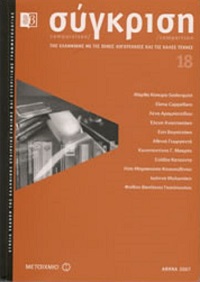Kazantzakis - Dante: the Divine Comedy
Abstract
After a few general considerations on literary translations and the difficulties that the translator could find in the poetic texts, we draw the image of Nikos Kazantzakis as a unique figure of testimony of the time.
Facing the linguistic problems of Dante's text, the Canti in the translation of Kazantzakis overcome the dimension of time through senses, passions, allegories, symbols, landscapes, love, desire.
Every linguistic aspect has a double rule: syntactic frequencies that fuse between the text and the context, the presence of the sense in the space-time and the interior theatrical aspect of meaning.
A very important element for Kazantzakis is his focus on the text in the greek language and culture. Abolishing the hierarchy between the original and it's translation, he moves on to textual autonomy, to a recognition of his creation without elaborating further on his general literary value. His historical and social relations with the language and the culture constitute a "political" choice and these are incorporated in the critical construction of the different identity of the text.
Sometimes, under the practice of the hyper-translation or the hypo-translation, he arrives at reducing the complexity of the text according to his stylistic availability. This procedure of such a provocative and creative interpretation is not only a "service" but a reconstruction of the original. This is not a translation-introduction moved to read Dante, but a transformation of the original; in other words it is a translation-text.
The ideological-poetic writing that leads Kazantzakis to Dante is a very complex one and, of course, he doesn't aim at a comparison of the original and the translation. Perhaps Kazantzakis chose Dante out of pride because the Florentine was the biggest of the poets.
Article Details
- How to Cite
-
Γκικόπουλος Φ. (2017). Kazantzakis - Dante: the Divine Comedy. Comparison, 18, 119–124. https://doi.org/10.12681/comparison.10288
- Issue
- Vol. 18 (2007)
- Section
- Articles

This work is licensed under a Creative Commons Attribution-NonCommercial-ShareAlike 4.0 International License.
Authors who publish with this journal agree to the following terms:
- Authors retain copyright and grant the journal right of first publication with the work simultaneously licensed under a Creative Commons Attribution Non-Commercial License that allows others to share the work with an acknowledgement of the work's authorship and initial publication in this journal.
- Authors are able to enter into separate, additional contractual arrangements for the non-exclusive distribution of the journal's published version of the work (e.g. post it to an institutional repository or publish it in a book), with an acknowledgement of its initial publication in this journal.
- Authors are permitted and encouraged to post their work online (preferably in institutional repositories or on their website) prior to and during the submission process, as it can lead to productive exchanges, as well as earlier and greater citation of published work (See The Effect of Open Access).



